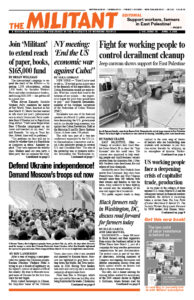In the wake of the collapse of three regional U.S. banks March 8-12 and the subsequent turmoil in financial markets worldwide, the Militant is excerpting below a section from The Low Point of Labor Resistance Is Behind Us: The Socialist Workers Party Looks Forward by SWP leaders Jack Barnes, Mary-Alice Waters and Steve Clark.
The government bailout of wealthy capitalist depositors has failed to stanch the crisis, which continues to reverberate. Shares in Credit Suisse — one of only 30 banks designated as a “global systematically important bank” by the Financial Stability Board — tumbled by more than 30% to an all-time low March 15.
To try to protect the U.S. banking system from a panic-fueled sell-off, 11 banks, led by JPMorgan Chase & Co. and Citigroup Inc., deposited $30 billion in First Republic Bank March 16, after its stocks plummeted and S&P Global Ratings downgraded it to “junk” status.
The excerpt below describes the long-term capitalist crisis unfolding today, the resulting social and moral crisis being foisted on workers, farmers and other exploited producers and the SWP’s perspective to help organize our class and unions to respond. Copyright © 2023 by Pathfinder Press. Reprinted by permission.
* * *
Class polarization is accelerating under the impact of US and world capitalism’s profit-driven crises of production and trade. As the obscene wealth of the Gateses, Zuckerbergs, Waltons, and Musks grows, to say nothing of the Rockefellers, Mellons, DuPonts, and other longtime ruling-class families, the deterioration of living and job conditions of working people and our families undercuts all pretense that “a rising tide lifts all boats.”
In the wake of billions of dollars of pandemic handouts, as well as sharp reductions in capitalist investment, production, and trade, the prices of food, fuel, housing, health care, and other necessities are rising (boats no, prices yes!). An extended period of stagnation, combining inflation with stagnating capitalist production and hiring, is increasingly likely both in the US and worldwide.
Even the share of workers in the US who are part of the workforce — that is, those who hold down a job or are looking for work — has declined since the late 1990s. For men between the ages of twenty-five and fifty-four, this so-called labor-force participation rate has fallen sharply, from 97 percent in 1960 to 88 percent today. Real wages, adjusted for inflation, have stagnated since the 1970s. The birth rate is falling. Life expectancy in the US has declined to seventy-six years, its lowest level in more than a quarter century.
Exploited farmers face skyrocketing prices for fuel, seed, fertilizer, equipment, and other supplies. At the same time, reaping vast profits from land speculation, capitalists — from the likes of superrich “philanthropist” Bill Gates, to wealthy farmers and agricultural corporations — buy up more and more farm acreage, driving up land prices and preventing small farmers from obtaining enough to be economically viable. Much of this accumulation has occurred under the guise of promoting “environmental protection.”
State and federal regulatory bureaus, such as water boards, groundwater agencies, the U.S. Environmental Protection Agency, and various environmental bodies on state and local levels, increasingly tighten restrictions on access to water to the benefit of large-scale capitalist agriculture.
Working farmers are pushed deeper into debt and often off the land entirely. Ranchers have no choice but to sell off all or part of their herds. Available water in rural communities, especially in drought-stricken areas, is vastly depleted, leaving many with wells gone dry. Every opportunity to drive a wedge between exploited producers on the land and working people in cities and small towns is promoted.
Working people the world over confront either comparably declining conditions, or much worse in the oppressed countries of Asia, Africa, the Middle East, Latin America, and the Caribbean.
Neither we nor anyone else can predict the direction of economic trends immediately ahead, or exactly how the class struggle will unfold. Amid inevitable cycles of capitalist business and trade, however, economic upturns will affect the working class, bolstering confidence and readiness to struggle. We’ve seen examples of this fact in the post-pandemic strikes and union struggles in the US, as we did during slumps and recoveries in the Great Depression of the 1930s.
What we do know is that whatever happens in capitalist economic and social life and the class struggle, our political course and program remain unchanged. Through building the unions and our conduct as unionists together with all other union members, we will respond to and advance the interests of our class and all the exploited.

